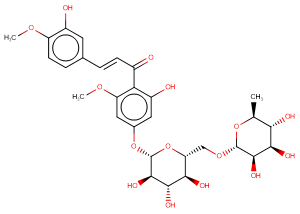
Hesperidin methylchalcone
CAS No. 24292-52-2
Hesperidin methylchalcone( —— )
Catalog No. M21239 CAS No. 24292-52-2
Hesperidin methylchalcone is the Citrus original products with powerful antioxidant activity. It can suppresse experimental gout arthritis in mice by inhibiting NF-κB activation.
Purity : >98% (HPLC)
 COA
COA
 Datasheet
Datasheet
 HNMR
HNMR
 HPLC
HPLC
 MSDS
MSDS
 Handing Instructions
Handing Instructions
| Size | Price / USD | Stock | Quantity |
| 25MG | 91 | Get Quote |


|
| 100MG | Get Quote | Get Quote |


|
| 200MG | Get Quote | Get Quote |


|
| 500MG | Get Quote | Get Quote |


|
| 1G | Get Quote | Get Quote |


|
Biological Information
-
Product NameHesperidin methylchalcone
-
NoteResearch use only, not for human use.
-
Brief DescriptionHesperidin methylchalcone is the Citrus original products with powerful antioxidant activity. It can suppresse experimental gout arthritis in mice by inhibiting NF-κB activation.
-
DescriptionHesperidin methylchalcone is the Citrus original products with powerful antioxidant activity. It can suppresse experimental gout arthritis in mice by inhibiting NF-κB activation.
-
In Vitro——
-
In Vivo——
-
Synonyms——
-
PathwayApoptosis
-
TargetNF-κB
-
RecptorNF-κB
-
Research Area——
-
Indication——
Chemical Information
-
CAS Number24292-52-2
-
Formula Weight624.6
-
Molecular FormulaC29H36O15
-
Purity>98% (HPLC)
-
SolubilityDMSO:1 mg/mL (16.1 mM)
-
SMILESC[C@@H]([C@@H]([C@H]([C@H]1O)O)O)O[C@H]1OC[C@H]([C@H]([C@@H]([C@H]1O)O)O)O[C@H]1Oc1cc(OC)c(C(/C=C/c(cc2)cc(O)c2OC)=O)c(O)c1
-
Chemical Name——
Shipping & Storage Information
-
Storage(-20℃)
-
ShippingWith Ice Pack
-
Stability≥ 2 years
Reference
1.Ruiz-Miyazawa K W Almeida P R F Borghi S M et al. Hesperidin methylchalcone suppresses experimental gout arthritis in mice by inhibiting NF-kB activation[J]. Journal of Agricultural & Food Chemistry 2018:acs.jafc.8b00959-.
molnova catalog



related products
-
Hentriacontane
Hentriacontane is a natural product with various pharmacological effects including anti-inflammatory, antitumor, and antimicrobial activities.
-
Ethyl caffeate
Ethyl caffeate is a potent chemopreventive compound against skin carcinogenesis caused by solar UV exposure.
-
Urolithin B
Urolithin B inhibits NF-κB activity by reducing the phosphorylation and degradation of IκBα, and suppresses the phosphorylation of JNK, ERK, and Akt, and enhances the phosphorylation of AMPK.?Urolithin B is also a regulator of skeletal muscle mass.Urolithin B is one of the gut microbial metabolites of ellagitannins, and has anti-inflammatory and antioxidant effects.



 Cart
Cart
 sales@molnova.com
sales@molnova.com


